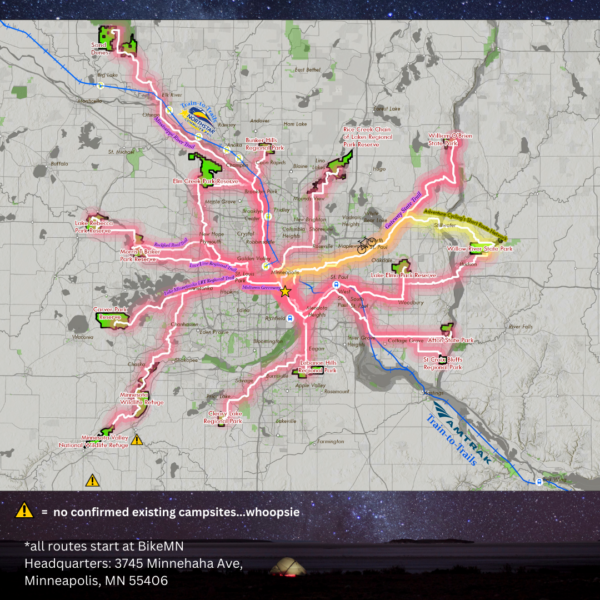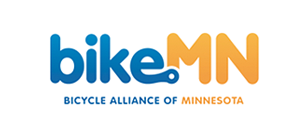
As an intern with BikeMN over the past year, I have enjoyed assisting with social media, the Saint Paul Classic, and the Minnesota Bike-Walk Summit. Along the way, I’ve been dreaming up something that would inspire and catalyze bike camping in the Twin Cities. After a year of work, what started as a blog post became a zine-inspired booklet that I am now excited to share with the world just in time for Bike Travel Weekend!
When I was a kid, the idea of riding my bike and pedaling off to see the world enticed me. The global pandemic has only strengthened this feeling. The privilege of remote work and the need for restoration and joy amidst some tough times has had me constantly considering “What if I just started biking and didn’t turn around? (Forest Gump style!).” Essentially, this is called bike touring. However, with many folks committed to work, family, community, and many other responsibilities, the possibility of going off on a grand bike adventure is just not accessible. For some people even, the idea of biking, let alone beyond their neighborhood, can seem like a momentous task and even dangerous. For these reasons, I was called to map some options for bike camping overnights in the Twin Cities Metro for those called to and curious about “shorter”, more manageable, bike adventures, while inspiring greater access to what can be cheap, restorative trips for those who may feel trapped in the city.

In the Twin Cities and across Minnesota, individuals and communities with some of the greatest needs for healing, restoration, and improved health outcomes often face systemic and ongoing barriers to accessing restorative, intact ecological spaces (majestic prairies, lush forests, cool lakes, and fresh air). Due to years of racist housing and land use policies and practices, BIPOC households are most likely to live near areas of concentrated pollution from cars, urban heat, lack of trees, and industry while being farther from well-resourced parks and “green” space. In Minneapolis for example, the Ewell law financed the tripling of the park system in the early 1900s along the lakes and in neighborhoods that could afford park expansion. Parks were not established in areas that could not afford to underwrite (publicly funded through special assessment tax) their expansion concentrating parkland in more wealthy and predominantly white neighborhoods. At the same time, mobility, freedom, and bodily autonomy related to accessing places within and outside of the inner city have been and continue to be deeply constrained by ongoing sexist, ageist, racist, classist, and ableist cultures, systems, and institutions communities must navigate on a daily basis, especially when deciding to adventure out into the world. Even as a young white man I often feel very exposed and vulnerable biking alone, but utilizing the knowledge and support of the national and local bike community I’ve been able to experience some amazing, joyful experiences on my bike.

With these realities, my hope for this booklet is to inspire and support communities, leaders, and individuals in the Twin Cities to dream, vision, and organize group trips, programming, and bike overnight adventures to support everyone in experiencing the much-needed joys of biking, community, camping, and whatever else one wants to throw into their adventure (swimming, barbequing, dance party).
The booklet highlights 15 bike camping overnight routes and destinations in the Twin Cities, weaves the personal experience of local bike campers, and concludes with an invitation to share your bike camping dreams and stories.
I hope you enjoy!
Spencer
